2016-11-17

On 17 October 2016, UNU-IAS and the University of Tokyo jointly organized the side event Resilience within Water Systems: The Quest for Strategies and Innovations in the Anthropocene at the UN Conference on Housing and Sustainable Urban Development (HABITAT III) in Quito, Ecuador. This event, another in the UNU-IAS SDG Dialogue series, brought together researchers to share their opinions and discuss specific concepts and ideas to contribute to the implementation of the Sustainable Development Goals (SDGs), focusing in particular on Goals 6 (clean water & sanitation), 11 (sustainable cities & communities), 13 (climate action), and 14 (life below water), as well as the New Urban Agenda adopted at HABITAT III.
Participants highlighted the role of science-based knowledge in building urban water resilience, showed how they integrate specific SDGs in the urban water environment through their research, and indicated practical approaches to better equip policymakers and city practitioners for sustainable urban development in the Anthropocene.
Shokhrukh Jalilov (UNU-IAS) opened the event by providing the audience with an overview of water-related challenges facing cities, incentives, and strategies that cities can develop to cope. This was followed by a keynote presentation delivered by Kazuhiko Takeuchi (Senior Visiting Professor, UNU; Professor, University of Tokyo). He introduced urban water-related issues in the context of SDGs, highlighted the importance of an integrated science-based approach for understanding the social-ecological and material-cycling spheres. He was followed by Xuemei Bai (Professor, Australian National University) who pointed out that urban institutions require re-structuring in order to adopt a systems approach, coordinate among stakeholders, and build networks to strengthen urban resilience. Thomas Elmqvist (Professor, Stockholm Resilience Centre) emphasized the need for a nature-based solution to building resilience in the Anthropocene.
In the panel discussion, the importance of the multi-functionality of water in cities to address areas such as green space, recreational space, and disaster mitigation was discussed. Interactive discussion with the audience revolved around questions such as how to bridge the gap between current urban development and creating resilient cities which can be responsible for coordinating integrated approaches to the SDGs. In his concluding remarks, Kensuke Fukushi (Visiting Professor, UNU-IAS; Professor, University of Tokyo) emphasized the role of scientists and stressed that systems- and science-based approaches present opportunities to contribute to the implementation of the SDGs, as well as the New Urban Agenda adopted at HABITAT III.